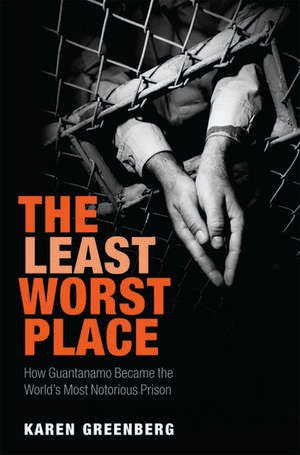The Least Worst Place: How Guantanamo Became the World's Most Notorious Prison
Autor Karen J. Greenbergen Limba Engleză Hardback – 19 mar 2009
Preț: 202.40 lei
Preț vechi: 232.10 lei
-13% Nou
Puncte Express: 304
Preț estimativ în valută:
38.73€ • 40.54$ • 32.05£
38.73€ • 40.54$ • 32.05£
Carte tipărită la comandă
Livrare economică 25-31 martie
Preluare comenzi: 021 569.72.76
Specificații
ISBN-13: 9780199557677
ISBN-10: 0199557675
Pagini: 288
Ilustrații: 1
Dimensiuni: 163 x 242 x 20 mm
Greutate: 0.58 kg
Editura: OUP OXFORD
Colecția OUP Oxford
Locul publicării:Oxford, United Kingdom
ISBN-10: 0199557675
Pagini: 288
Ilustrații: 1
Dimensiuni: 163 x 242 x 20 mm
Greutate: 0.58 kg
Editura: OUP OXFORD
Colecția OUP Oxford
Locul publicării:Oxford, United Kingdom
Recenzii
Greenberg is a great storyteller.
Read this book for an understanding of the fearsome banality of the workings of arbitrary power.
Greenberg tells an excellent human story, efficiently piecing together the accounts of the guards, inmates and lawyers.
If you thought Guantanamo held no more surprises, this remarkable and timely book will change your mind. Karen Greenberg has unearthed a history we did not know we had, somehow persuading scores of military and intelligence officers-and their former captives-to break a seven-year silence. Packed with revelations, this vivid story shows exactly how nods and winks from Washington led to lawless abuse. Just at the moment we need it most, with a new president vowing to find a way out, Greenberg gives the best account yet of where and how and why the troubles began.
Greenberg tells a gripping and vivid story of the first days of the Guantanamo detainee debacle. In a fast paced and well researched narrative, her characters come alive on this dusty island base as they struggle with the moral and professional dilemmas that are a microcosm of a bigger drama being played out in Washington. Policy was formulated by a small cabal of Pentagon and White House zealots who did not understand the fundamental nature of counterterrorism-and forced their ill-conceived policies on a reluctant but ultimately compliant military, judicial and diplomatic corps.
The consequences of Guantanamo on America's standing in the world have been well chronicled, but here, in heartbreaking detail, we learn the story of how it might have been different. Karen Greenberg's surprising and provocative history of the first hundred days of Guantanamo provides an invaluable comment on how the war on terror turned into a moral assault on our on values and institutions.
Karen Greenberg's deeply researched account of the early days of Guantanamo shows the legal, political and moral questions that plagued the prison camp from the outset: its dubious legal authority, the uncertain status of the prisoners, and the doubts of key officials who tried to uphold American and international law. The Least Worst Place, which is so well written that it reads in places like a prose poem, is going to be essential reading for anyone who is trying to understand the legal morass surrounding Guantanamo and detainee policy in the 'war on terror.'
Read this book for an understanding of the fearsome banality of the workings of arbitrary power.
Greenberg tells an excellent human story, efficiently piecing together the accounts of the guards, inmates and lawyers.
If you thought Guantanamo held no more surprises, this remarkable and timely book will change your mind. Karen Greenberg has unearthed a history we did not know we had, somehow persuading scores of military and intelligence officers-and their former captives-to break a seven-year silence. Packed with revelations, this vivid story shows exactly how nods and winks from Washington led to lawless abuse. Just at the moment we need it most, with a new president vowing to find a way out, Greenberg gives the best account yet of where and how and why the troubles began.
Greenberg tells a gripping and vivid story of the first days of the Guantanamo detainee debacle. In a fast paced and well researched narrative, her characters come alive on this dusty island base as they struggle with the moral and professional dilemmas that are a microcosm of a bigger drama being played out in Washington. Policy was formulated by a small cabal of Pentagon and White House zealots who did not understand the fundamental nature of counterterrorism-and forced their ill-conceived policies on a reluctant but ultimately compliant military, judicial and diplomatic corps.
The consequences of Guantanamo on America's standing in the world have been well chronicled, but here, in heartbreaking detail, we learn the story of how it might have been different. Karen Greenberg's surprising and provocative history of the first hundred days of Guantanamo provides an invaluable comment on how the war on terror turned into a moral assault on our on values and institutions.
Karen Greenberg's deeply researched account of the early days of Guantanamo shows the legal, political and moral questions that plagued the prison camp from the outset: its dubious legal authority, the uncertain status of the prisoners, and the doubts of key officials who tried to uphold American and international law. The Least Worst Place, which is so well written that it reads in places like a prose poem, is going to be essential reading for anyone who is trying to understand the legal morass surrounding Guantanamo and detainee policy in the 'war on terror.'
Notă biografică
Karen J. Greenberg is the Executive Director of the Center on Law and Security at the NYU School of Law and a frequent commentator on issues related to the war on terror, ranging from detention and torture to the terrorist threat. She is the editor of numerous books, including The Torture Papers: The Road to Abu Ghraib and the Terrorist Trial Report Card which has tracked all US terrorism cases to go through the US courts since 9/11. Her work has appeared in The Guardian, The Finanical Times, the Nation, the American Prospect, and many other publications.








